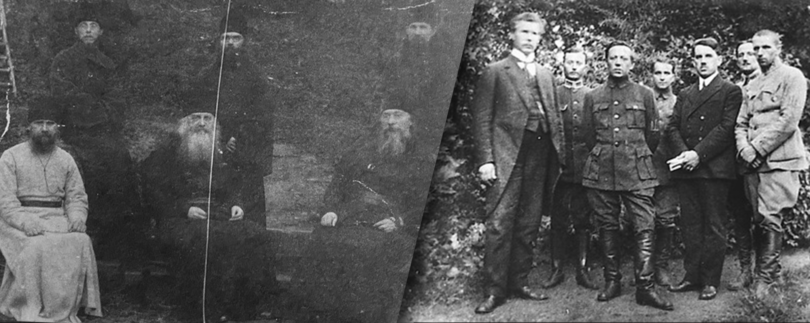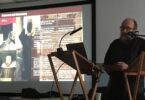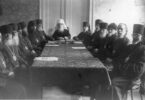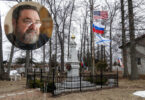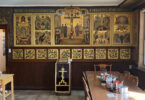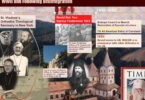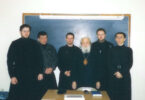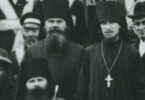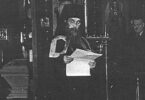Metropolitan Anthony (Khrapovitskii) was arrested along with a number of other churchmen by the Directorate Government on December 17-18 in 1918.
On November 7/20, 1917, following the Bolshevik Revolution in Moscow and Petrograd, Ukraine became a people’s republic in the federation with Soviet Russia. The strong tendency towards organizing a new independent Ukrainian state based on ethnical and cultural identity resonated with some church people in Ukraine. In October 1917, the Ukrainian military held a congress at which the question of the All-Ukrainian Church Council was discussed. On November 23, 1917, the clergy and laypeople founded the All-Ukrainian Provisional Orthodox Church Assembly (Rada) in Kiev. The Rada was tasked with organizing the All-Ukrainian Church Council. This Rada was recognized by the new Ukrainian socialist government. The retired Archbishop Aleksei Dorodnitsyn (d. 1919) agreed to lead this assembly. The Rada treated the restoration of the Russian Patriarchate with the utmost suspicion, believing that its activity in Ukraine would result in the expansion of Russian imperialism.
On January 11, 1918, Oleksandr Karpynsʹkyi, a newly founded Ukrainian People’s Republic representative, expressed the government’s desire to have an independent church in the independent state. At the All-Ukrianian Council that year, Metropolitan Anthony (Khrapovitskii) of Kiev and Galich did not sympathize with those striving for local church independence. This negative attitude contributed to the further radicalization of the so-called Church Rada. It resulted in the departure of their representatives from the second session of the All-Ukrainian Council in the summer of 1918. Having lost any hope of being understood by the Ukrainian Autonomous Church under the Moscow Patriarchate, the members of the Rada movement started their own “self-consecrated” (schismatic) church in 1921.
On December 14, 1918, Hetman Pavlo Skoropadsʹkyi’s government was toppled in a coup d’état led by the Ukrainian socialist and nationalist politicians Symon Petliura and Volodymyr Vynnychenko. The so-called Directorate Government of the Ukrainian People’s Republic did not plan for dialogue with the Ukrainian Autonomous Church of the Moscow Patriarchate. The Russian “imperialist” hierarchs Metropolitan Antonii, Archbishop Evlogii of Volynia, Bishop Nikodim of Chyhyryn, as well as Archimandrite Vitalii Maksimenko, Priestmonks Tikhon Sharapov and Nikolai, were forcibly confined within a Greek-Catholic monastery in Buchach in Galicia. Having been confined for five months there, Metropolitan Anthony wrote Opyt pravoslavnogo khristianskogo katekhizisa [a non-official Cathecism] and Slovar’ k tvorniam Dostoevskogo [Explanation of the key figures and ideas in the works of Fyodor Dostoevsky].
Archimandrite Vitalii (Maksimenko) was close to Metropolitan Antonii from his student years at the Kazan Theological Academy, from which he graduated. Perhaps this explains the following account Metropolitan Evlogii provided in his memoirs: Fr. Vitalii, a quick-tempered person, once called their Communion demons’ food in his discussions with the Uniate monks. At the same time, Metropolitan Antonii discussed with other inmates whether it is permissible for the Orthodox to make the sign of the cross in a Uniate church. He decided that it is permissible wherever the image of the cross is present.
Metropolitan Platon (Rozhdestvenskii) of Odessa became a deputy to Metropolitan Antonii of Kiev after his arrest. On December 30, 1918, he sent a telegram to Archbishop Randall of Canterbury, informing him about the arrest of his superior. At the time of the sending this telegram, Odessa was under the control of the French Brigadier General Philippe d’Anselme, chief of Entente troops in the South of Russia. In February 1919, Henry Freydenberg, Chief of Staff to General d’Anselme, demanded the release of the bishops from Buchach during negotiations with the Minister of Trade and Industry of the Directorate Government, S. Ostapenko. In May 1919, after the Polish Army took over Galicia, the bishops were transferred to the Greek-Catholic monastery of St. George in Lviv, then further to the Camaldolese convent near Kraków before finally released through into Serbia.
Sources:
Monk Veniamin (Gomarteli),“Letopis’ tserkovnykh sobytii nachinaia s 1917-go goda,”[Timiline of Church Events Beginning with 1917]. Part One, Historical Studies of the Russian Church Abroad.
Metropolitan Evlogii (Georgievskii), Put’ moei zhzni [My Lifejourny] (Paris, 1947)
Protodeacon Andrei Psarev, “Conciliar Movement in Ukraine in 1917–1921. History Does Not Repeat Itself, but Patterns Do,” Historical Studies of the Russian Church Abroad

